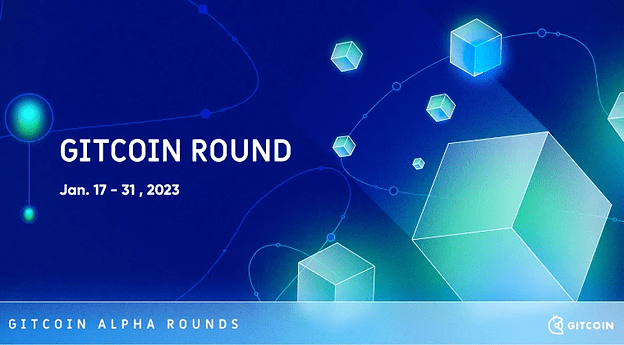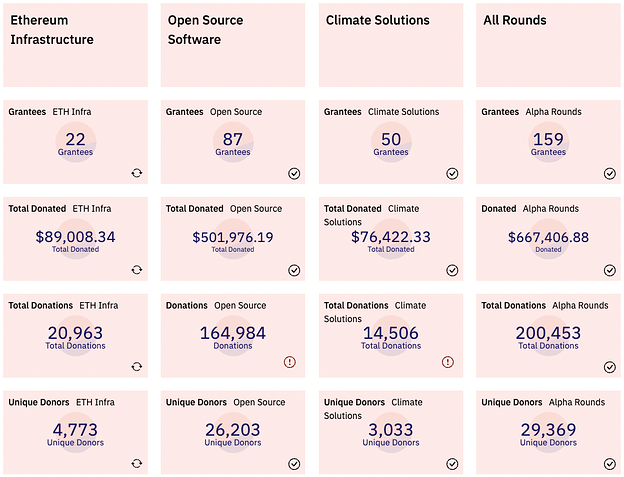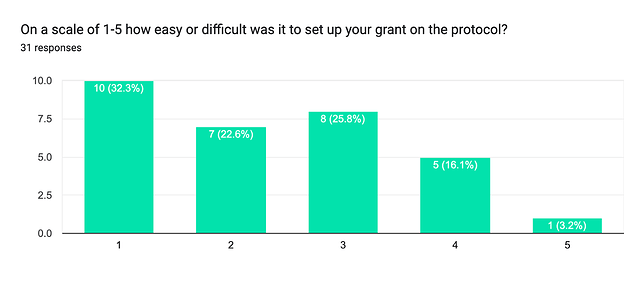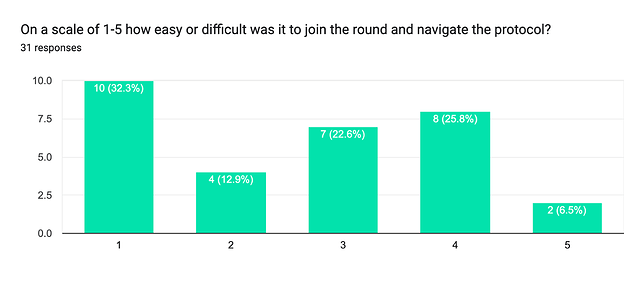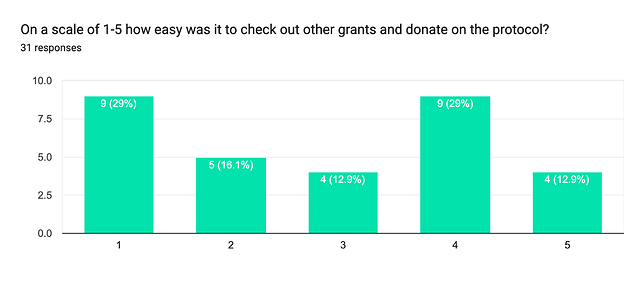TL;DR
- The Gitcoin Program Alpha Round was conducted on the new protocol from January 17-31, 2023.
- It consisted of 3 curated rounds with their own matching pool: Web3 Open Source Software, Ethereum Infrastructure, and Climate Solutions.
- There were 159 returning grants split between the rounds; invited based on funding criteria from GR14 and GR15.
- A total of $667k was donated from more than 29k unique wallets, and more detailed results can be seen in this Dune Dashboard.
- Operating this round allowed us to test the functionality of the protocol, discover bugs, learn the best practices, and collect feedback from users all while continuing to provide impactful funding to Gitcoin Grantees.
- It also helped us to plan for the future and get excited about the next iteration of the Grants Program
Background + Objectives:
The Gitcoin Program Alpha Round was the first program-sponsored grants round to run on the new Grants Stack. After GR15 wrapped up in September 2022, the idea of running the next grants round on this decentralized protocol was discussed at length in the governance forum. This was an exciting prospect as it meant we would finally sunset cGrants after 15 seasons and take the leap into a new decentralized future. However, the initial discussion assumed we would “skip” a round in the regular cadence and run the first protocol round in the spring of 2023.
Eventually, a new option was proposed in the forum - instead of skipping a round, we’d run a streamlined Alpha Round on the protocol in place of GR16. This would feature 3 distinct grant rounds; Web3 Open Source Software, Ethereum Infrastructure, and Climate Solutions. We proposed these themes as they are our longest-standing Gitcoin rounds and are at the heart of the mission to fund public goods in our community. After passing a GTC Snapshot vote the round structure was locked in and the Alpha Round preparation began.
The primary goal of running this Alpha Round was to test and get feedback on the new decentralized protocol while allocating meaningful funding to a subset of the most engaged grantees from GR14 and GR15. It provided challenges and opportunities for all workstreams in a curated environment with less risk than a traditional-sized round. The experience and feedback gained from this round are currently being used to improve the protocol and are shaping discussions around the future of the Grants Program.
Structure + Details:
Considering this was the first Gitcoin Program round to run on the freshly-developed protocol, we knew we could not run a fully “open” round. We had to strike a balance between supporting grantees who needed the funding while keeping the load on the protocol at a manageable level. The PGF and GPC workstreams came together and decided we could support a maximum of 250-300 grants across the 3 rounds, at which point we used a data-driven approach to develop the baseline eligibility criteria that would determine which grants received an invite.
In short, we invited projects that were active in GR14 and/or GR15 and met a threshold of funding or unique donations. In total, we invited ~250 projects in the OSS Round, 40 individual projects plus 10 bundled grants based on use case (e.g., renewable energy) in the Climate Round, and 30 projects in the ETH Infrastructure Round.
However, meeting this threshold and receiving an invite did not mean a grant would be automatically accepted into the round. Grants had to meet both the general platform and round-specific eligibility criteria in addition to being on the invite list. The round-specific criteria are summarized below:
- Web3 Open Source Software grants had to be open-source projects with meaningful Github activity in the prior 3 months that has demonstrated work completed towards the project’s mission. Additionally, they needed to be primarily focused on developing on top of or advancing the broader Ethereum and/or Web3 industry.
- Ethereum Infrastructure grants were required to be focused on building things that directly advance the Ethereum ecosystem. This includes core client devs, tooling, developer education, and more.
- Climate Solutions featured climate-oriented grants and bundles of projects grouped by use case from previous rounds.
After sending out invites and reviewing applications, there were 87 grants in the Web3 OSS round, 22 in Ethereum Infrastructure, and 40 grants + 10 bundles in Climate Solutions for a total of 149 grants and 10 bundled grants (which included another 82 climate solutions projects).
All 3 rounds were allocated a matching pool of $333k, for a total of $1 Million**. The round ran from January 17th to 31st.
**Note: At the time of writing, matching fund calculations are still ongoing. Matching figures will be shared at a later date.
Data Analysis:
A huge shoutout goes to @umarkhaneth for his work in creating Dune dashboards for the Alpha Round as a whole and for each of the 3 rounds. The high-level results can be seen below:
If you want to check out the data in-depth, here are the dashboard links:
If you’re interested in diving in even further, check out Umar’s forum post that discusses these results, compares the rounds to each other, analyzes overlapping donors and community retention, and more.
Product Improvements/Feedback:
First off, I’d like to give the GPC workstream a lot of credit for working tirelessly to get the Allo Protocol/Grants Stack to a place where we were even able to run these rounds. It was a huge feat but they did a great job through the development process to make sure the core functionality was ready.
These rounds proved to be a great opportunity to test out the protocol and see what needed to be fixed or added on. For example, an issue that affected many donors was the overloading of the Gitcoin Passport infrastructure. This meant many people could not get the required number of stamps to pass the scoring threshold and have their donations eligible for matching. The Passport team worked hard to get this under control and eventually migrated Passport to its own database in order to make it more robust going forward. Although this was a tough challenge to overcome and affected many donors, it allowed us to learn from a real stress test and be better prepared for future rounds. For more details, check out the full post-mortem from the product team.
Additionally, if you were a grantee or donor and have feedback for product/protocol improvements, please share it here: https://forms.gle/um3JbjCuReTectcj7
Operational Insights:
On the operational side, we were able to learn a ton from creating and managing 3 rounds with multiple people getting their hands dirty and gaining experience with the protocol. We were able to see where the gaps in our processes were and identify what functionality we’d like to see added to the Grants Stack products in order to run rounds more efficiently. One example of this was the limited functionality for reviewing grants; we took note of the features that would make the process faster for round managers and fairer for grantees and have begun some interesting cross-workstream discussions around this.
By learning through operating a real round, we’re building up our knowledge and best practices for round managers. It will not only help Gitcoin run stronger rounds in the future but facilitate the teaching of others as we begin the process of decentralizing and shaping the new grants program.
Survey Results:
Here is the anonymous feedback from grantees who responded to our survey after the conclusion of the round. The detailed responses can be found here and a TL;DR of the questions and results are summarized below:
Grantees were asked the following quantitative questions where 1 = very easy and 5 = very difficult. Each question was followed with a short answer prompt where we asked the grantees to elaborate on their experience. The last two questions were focused on an overall impression of the round and any features they wanted to see added before the protocol beta launch.
The feedback received from this survey has been shared with GPC and many of the issues have either been resolved or are currently being addressed. Additionally, feature requests have been noted and are helping to shape the next few months of the product roadmap.
Q1: Please elaborate on your experience of setting up a grant:
TL;DR - Most grantees found it fairly easy to set up their grant on the protocol, as the majority of responses were a 1, 2, or 3 shown above. Common responses for this short answer question were issues with verifying Twitter & Github, a lack of rich text functionality in the grant description, being unable to preview the grant page before submitting the transaction, confusion around supported networks, and fairly high gas fees on Ethereum mainnet.
Q2: Please elaborate on your experience of joining the round and navigating the protocol as a grantee:
TL;DR - This step did not go as smoothly as the numbers above were a bit more skewed towards the difficult side. Common themes in the grantee responses were confusion around the fact that applying to the round was a separate step from grant creation, having minimal data they could see for their grant, and general issues with navigating Grants Hub and Explorer once they were in the round. However, there was a significant amount of people who found it quite easy and had no issues at all.
Q3: Please elaborate on your experience of checking out grants and donating:
TL;DR - This distribution was very similar to the previous question with many grantees finding it very easy; yet many others finding it difficult. Common responses were issues with finding specific grants/lack of a search function, passport issues, trouble switching between the 3 rounds, lack of a “home page” for all the rounds, problems with the checkout flow/UX, and a desire to have zkSync as a checkout option again.
Q4: How satisfied are you with your overall experience in the Alpha Round? What went well and what didn’t?
TL;DR - Overall, most grantees were quite happy with the round. The impression I got from reading these responses was gratitude and an understanding that this was a very early iteration of the protocol. They knew there’d be some bugs to work through and many grantees mentioned they were surprised with the donor turnout and strength of the community. The most common things they wanted to see improved were the passport issues and overall UI/UX.
Q5: What features you would like to see the product team focus on before the protocol beta launch in the Spring?
TL;DR - The most common response to this question was definitely the ability to see donation totals and estimated matching on individual donations. Other things mentioned were again passport improvements, overall stability & speed, more blockchains/L2 support, and additional data available for grantees.
Thank You!!
The Grant Ops Team would like to extend a huge thank you to all grantees and donors who made this Alpha Round a resounding success and valuable learning experience. We could not be more excited about the future of the protocol and Grants Program and we would not be in this position without our engaged community.
Thanks for making it this far and stay tuned for more program updates in the coming weeks!
